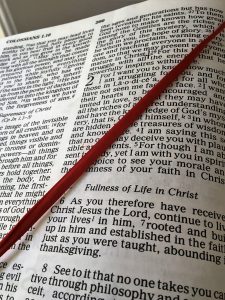 The law of the Lord is perfect, refreshing the soul. The statutes of the Lord are trustworthy, making wise the simple. The precepts of the Lord are right, giving joy to the heart. The commands of the Lord are radiant, giving light to the eyes. The fear of the Lord is pure, enduring forever. The decrees of the Lord are firm, and all of them are righteous. They are more precious than gold, than much pure gold; they are sweeter than honey, than honey from the honeycomb. By them your servant is warned; in keeping them there is great reward (Psalm 19:7-11 NIV).
The law of the Lord is perfect, refreshing the soul. The statutes of the Lord are trustworthy, making wise the simple. The precepts of the Lord are right, giving joy to the heart. The commands of the Lord are radiant, giving light to the eyes. The fear of the Lord is pure, enduring forever. The decrees of the Lord are firm, and all of them are righteous. They are more precious than gold, than much pure gold; they are sweeter than honey, than honey from the honeycomb. By them your servant is warned; in keeping them there is great reward (Psalm 19:7-11 NIV).
In this section, David lifts up the Scriptures, God’s special, written revelation, to those who listen to his song. Remember that the Psalms were written to be sung. God loves art. He designed us to delight in music and to make music. David uses six predicate adjectives that tell us what the Scriptures are. Four of these are somewhat synonymous, which serves to emphasize the quality of God’s message. It is perfect, right, radiant and pure. The Bible covers all aspects of life about living in the presence of the living God, of knowing him and pleasing him, and of relating rightly to other people. There are no imperfections in the Bible, since it is the message of the perfect, righteous Lord. This is one of the foundations of the doctrine of the inerrancy of the Scriptures. God does not lie, and he is all-wise, making mistakes in his revelation impossible. Most of the supposed errors in the Bible are really failures by people to understand the text or stem from people’s disagreement with God about his ways. The rest are basically a lack of information about matters that we suppose the Lord should have told us more about! Many of these have “disappeared” over time as additional archaeological and historical investigation have constantly demonstrated the perfection of the Scriptures.
The other two predicate adjectives (trustworthy and sure) proclaim the reliability of God’s word. In a world of constant change and corruption, we have a dependable foundation for our faith and hope. All of these adjectives “move in a different world from the compromise, insincerity and half-truths of human intercourse” (Kidner).
Next, we observe that David uses six verbal phrases to set forth four ways the Scriptures affect people, and then he praises the word of God in two ways.
- The Bible “revives” or “turns” the soul (the whole self or person). “Making the man to be returned or restored to the place from which sin had cast him” (Spurgeon).
- God’s word “makes wise” those who need to be taught the right way to live and the correct attitudes to have (cf. 2 Timothy 3:15; Psalm 119:130). “The beginning of conversion, and so all along, the increase of all grace to the end, is expressed by wisdom entering into a man’s heart” (Goodwin).
- The Scriptures “give joy” to the heart (the totality of our inner nature). God has a means for making us glad—the teaching of his word. As we reach his understanding of life and bow before him and his purposes, our emotional outlook is transformed. Notice the progression. When we are turned back to God and made wise, joy returns to the person. Joy is a by-product of God’s free grace. The tragedy of the human race is in seeking for joy in empty boxes.
- God’s message also “gives light” to the eyes. Light in the Scriptures usually means either holiness or accurate knowledge. The eyes are “used to express knowledge, character, attitude, inclination, opinion, passion and response…a good barometer of the inner thoughts of a man” (TWOT). If we listen to God’s voice in his written word, our approach to living will be changed in an observable manner. If we look at the sun, our eyes will go blind, but if we gaze steadily at the light of God’s word, our spiritual sight grows stronger and clearer.
- The Bible “endures forever.” When all else fails and passes away, a firm foundation remains (Matthew 24:35). The opinions of the wisest men of one generation are discarded as useless trash by the next. Each generation is in love with its own wisdom, only to be called fools by those who follow. How different is the Bible! Throughout the generations its accurate portrayal of life remains constant.
- The last phrase, which is very difficult to put into English as a verb form, also is a praise of God’s word. Perhaps we can say it is “being righteous altogether.” In all its parts, each and everyone, it shines with being right; that is, it has the same character as God.
Please read the above verses from Psalm Nineteen over and over. Let their music permeate your heart. Think about them, rejoice in them, and choose the ways of God by them.
Grace and peace, David

 The law of the Lord is perfect, refreshing the soul. The statutes of the Lord are trustworthy, making wise the simple. The precepts of the Lord are right, giving joy to the heart. The commands of the Lord are radiant, giving light to the eyes. The fear of the Lord is pure, enduring forever. The decrees of the Lord are firm, and all of them are righteous. They are more precious than gold, than much pure gold; they are sweeter than honey, than honey from the honeycomb. By them your servant is warned; in keeping them there is great reward (Psalm 19:7-11 NIV).
The law of the Lord is perfect, refreshing the soul. The statutes of the Lord are trustworthy, making wise the simple. The precepts of the Lord are right, giving joy to the heart. The commands of the Lord are radiant, giving light to the eyes. The fear of the Lord is pure, enduring forever. The decrees of the Lord are firm, and all of them are righteous. They are more precious than gold, than much pure gold; they are sweeter than honey, than honey from the honeycomb. By them your servant is warned; in keeping them there is great reward (Psalm 19:7-11 NIV).